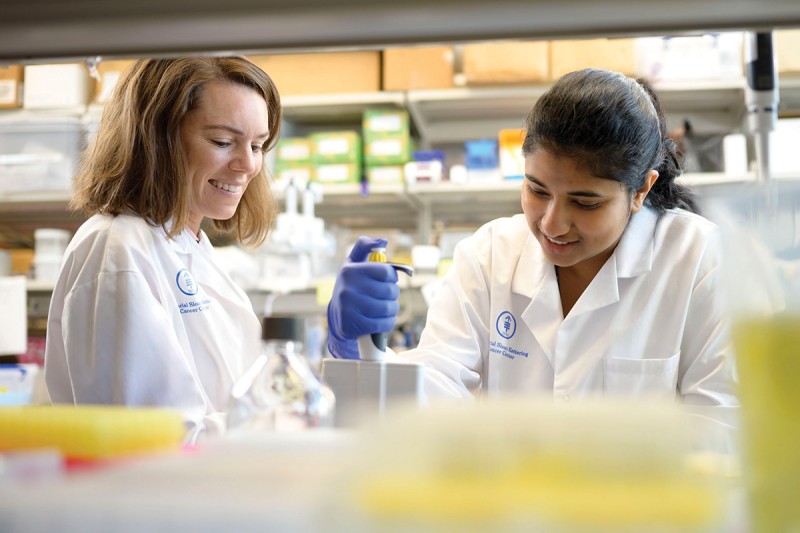
When physician-scientist Chrysothemis Brown, MBBS, PhD, talks about the process of scientific discovery and the nuances of the immune system, the sincerity of her enthusiasm is unmistakable.
“What I love about science is the freedom and creativity,” Dr. Brown says. “And if you discover something, you’re the first person in the world to see it. It’s incredibly exciting and at the same time an enormous privilege.”
And already, the pediatrician and researcher, who founded her lab at Memorial Sloan Kettering Cancer Center (MSK) in early 2021, has had a number of these firsts.
Notably, she co-led a research team that uncovered a new class of immune cells that play a key role in training babies’ immune systems not to attack the helpful bacteria in the digestive system.
“The immune system is very dynamic,” Dr. Brown says. “Not only can it change in hours in response to an infection but it also changes over the course of your lifetime.”
She and her colleagues identified a window in the early weeks of life where a “developmental wave” of these newly discovered immune cells rises and falls.
The study — a collaboration with mentor Alexander Rudensky, PhD, who chairs the Immunology Program at MSK’s Sloan Kettering Institute — appeared in Nature, one of the world’s premier scientific journals.
“This opened up a whole new area of investigation for us,” she says. “Basic questions like, ‘What causes this wave to start?’ And, ‘What causes it to stop?’
“But what’s also interesting is that we found that these cells can reemerge in adulthood in the context of cancer — so now we wonder whether tumors co-opt this developmental program to suppress the immune response against cancer. That’s something that we’re very actively working on,” she says.
Beyond cancer, Dr. Brown’s research within MSK’s Human Oncology and Pathogenesis Program is also helping to illuminate autoimmune disorders, like arthritis. (MSK’s foundational biology research frequently has applicability in areas beyond cancer.)
The Path of a Rising Star
Dr. Brown was born in London and grew up in Cambridge, England, where her parents’ careers in medicine and research inspired her own pursuit of science. As a teen, she spent summers working in her father’s lab studying the genetic underpinnings of hypertension.
She fell in love with immunology during medical training at Oxford University and then pursued doctoral work at King’s College London, where she studied the role of vitamin A as a regulator of the immune system.
“I spent three and a half years working on that, and we made an interesting discovery that showed how vitamin A influences T cell differentiation. And that really opened my eyes to just how much the immune system can be modulated by, for example, dietary metabolites.”
Wanting to probe deeper into the regulation and development of the immune system, Dr. Brown did her postdoctoral research in the lab of Dr. Rudensky, a world-renowned immunologist.
“She is fearless as a scientist, ready to take on big, important questions with no hesitation,” Dr. Rudensky says. “Her agility in scientific pursuits is really her trademark — pivoting as observations lead to new insights and focusing in on the most exciting, novel, and promising paths.”
A Generous Mentor Herself
Yoselin Paucar Iza, a graduate student in Dr. Brown’s lab, said that as a mentor, Dr. Brown champions her trainees’ curiosity, supports their strengths, and nurtures their weaknesses.
“What we’ve learned from her is to really be guided by what the science is telling us,” Paucar Iza says. “And it’s clear she’s never scared to go into areas that our lab may not already have expertise in, or to ask the tough questions that others might shy away from because of how challenging they are.”
Not only has Dr. Brown been the recipient of prestigious awards — including recently being named a Pew Scholar in the Biomedical Sciences — but trainees in her lab also have received notable recognitions.
This year, Dr. Brown and Paucar Iza were jointly awarded a Gilliam Fellowship from the Howard Hughes Medical Institute, a program committed to advancing equity and inclusion in science.
And lab member Gayathri Shibu received a Marie-Josée Kravis Women in Science Endeavor Graduate Fellowship.
“Science can be really tough, and there’s a lot of failure baked in,” Dr. Brown says. “So you have to enjoy the process itself and not lose your confidence in what you’re doing when you hit a snag. That’s why I try to really be a cheerleader for everyone in the lab and make a fun environment that also supports their freedom and creativity.”
Dr. Brown is a Josie Robertson Investigator.